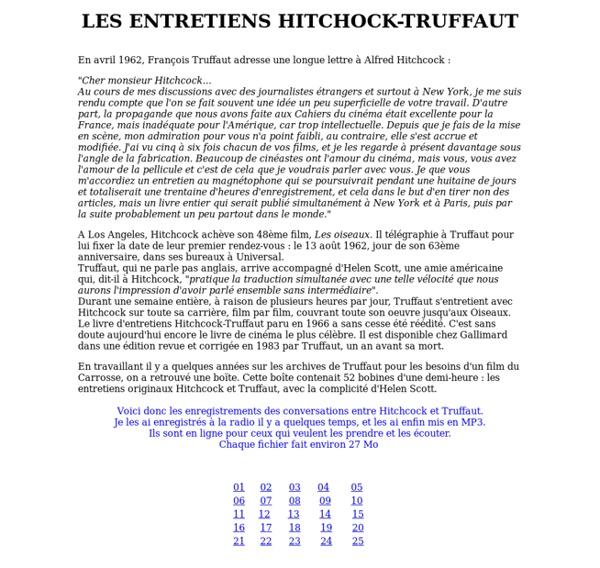Entretiens Hitchcock - Truffaut
En avril 1962, François Truffaut adresse une longue lettre à Alfred Hitchcock : "Cher monsieur Hitchcock... Au cours de mes discussions avec des journalistes étrangers et surtout à New York, je me suis rendu compte que l'on se fait souvent une idée un peu superficielle de votre travail. D'autre part, la propagande que nous avons faite aux Cahiers du cinéma était excellente pour la France, mais inadéquate pour l'Amérique, car trop intellectuelle. A Los Angeles, Hitchcock achève son 48ème film, Les oiseaux. En travaillant il y a quelques années sur les archives de Truffaut pour les besoins d'un film du Carrosse, on a retrouvé une boïte.
Il était une fois le cinéma - La passion du cinema
Emmanuelle.Walker
novembre 2006
Voici les différentes références dont j’ai pu parler lors de ma première conférence (aux Beaux Arts de Rennes la semaine dernière) concernant l’évolution du design interactif. Dans cette première partie je fais un bref résumé de l’évolution du design des interfaces graphiques depuis 1945. Cette série de conférences est issue de mes trois articles écris pour la revue Marie Louise (merci les deValence;-) le plan :1.1 historique et évolution des réseaux1.2 historique des technologies informatiques à partir de 19451.3 une très très courte histoire des jeux vidéos 1.1 historique et évolution des réseaux • Le 24 mai 1844, Samuel Morse effectue la première démonstration publique du télégraphe en envoyant un message entre les villes de Philadelphie et Washington. • 1867 L'Américain Graham Bell invente le téléphone et fonde la compagnie Bell. • 1967 Lawrence G. • 1969 ARPANET, septembre : BBN installe le premier équipement-réseau à l'UCLA et y connecte le premier ordinateur (un XDS SIGMA 7).
Related:
Related:



